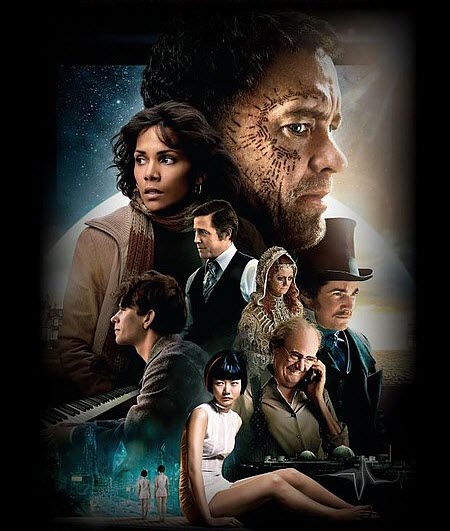I finally did get to see Cloud Atlas in the theater today. I had such high hopes for this movie. The trailer promised a story so grand and ambitious in scale that I just knew I was going to love-love-love it and it would supply meaning and purpose to my life ever after. “Death. Life. Birth. Future. Present. Past. Love. Hope. Courage. Everything Is Connected.” A unified theory of everything, right?
- A homesick and physically sick young lawyer on a sailing ship in Polynesia
- A talented but louche con man who acts as an amanuensis to a famous composer
- An elderly publisher with debt problems who is involuntarily institutionalized by his own brother
- An ambitious journalist on the trail of a story too hot to be told
- A cloned slave who begins an ascent to consciousness that ends in revolution
- A goat herder just trying to survive in a post-apocalypse Hawaii that looks like the far-distant past with the help of a “prescient” who seems to come from the far-distant future
If I hadn’t read the book, the movie would have been a completely nonsensical hash, but oddly enough, seeing the movie made me like the book even less. As partial as I am to the written word, that’s a first for me.
The whole reincarnation angle was missing from the book, along with its themes of karma, the soul’s evolution, and kindred souls finding each other again in life after life. To illuminate those themes, the filmmakers used the same actors in key roles in each of the six stories to drive home the point that “we are all connected” and that “our lives are not our own. We are bound to others, past and present. And by each crime, and with every kindness, we birth our future.” So we keep encountering the same people over and over again in different bodies, of course–loving or hating them, protecting or hunting them, curing or killing them according to whatever master narrative is driving that particular incarnation.
What also didn’t come through in the book was any sense of real love between the various couples, which was touchingly shown in the movie because movie audiences like romances and happy endings, I suppose. Most of the relationships in the books simply stopped, unresolved, with no indication that they resumed or resolved in other lives. I am a pretty careful reader and I like a happy ending as much as the next person, so I think I would have noticed if the author had actually written that.
I was able to sort out that the themes of abolition, slavery, confinement, escape and freedom run through all the stories. One point the book also spells out that the movie scarcely touches is the idea that a selfish, predatory race of beings that regards “weaker” beings as nothing more than a means to an end will certainly destroy itself. When nothing matters but consumption and profit, cloning human beings and then slaughtering them and rendering them into their own feed is just a matter of good business because “recycled replicants are a cheap source of protein.” In so many ways, one class or race or tribe of humans has reduced another (weaker) class or race or tribe to nothing more than meat to be consumed in the fields or factories or arenas.
The lawyer on the ship finally makes it home, barely alive, and he writes:
Belief is both prize & battlefield, within the mind & in the mind’s mirror, the world. If we believe humanity is a ladder of tribes, a colosseum of confrontation, exploitation & bestiality, such a humanity is surely brought into being and [evil] shall prevail. You & I, the moneyed, the privileged, the fortunate, shall not fare so badly in this world, provided our luck holds. What of it if our consciences itch? Why undermine the dominance of our race, our gunships, our heritage & our legacy? Why fight the ‘natural’ (oh, weaselly word!) order of things?
Why? Because of this:–one fine day, a purely predatory world shall consume itself …. In an individual, selfishness uglifies the soul; for the human species, selfishness is extinction.
Is this the doom written within our nature?
If we believe that humanity may transcend tooth & claw, if we believe divers [sic] races & creeds can share this world [peaceably], if we believe leaders must be just, violence muzzled, power accountable & the riches of the Earth & its Oceans shared equitably, such a world will come to pass. I am not deceived. It is the hardest of worlds to make real.
One hopes that the human race will evolve quickly enough to avoid “the fall” and the apocalypse that renders most of the planet uninhabitable and the few remaining people on it barely more than savages. One wants to believe it is possible for us to save us from ourselves.

